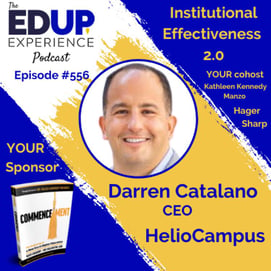The higher education landscape continues to evolve with growing pressures. Still, there are some promising trends that institutional leaders should keep their eye on if they want to stay one step ahead of the growing pressures facing higher ed today and ensure they’re leading their institution through today’s high stakes.
Institutional Effectiveness Trends to Monitor
A common thread in higher ed trends today is a renewed focus on relevant, customizable lifelong learning. The concept of lifelong learning has been around for years, but it’s struggled to gain traction. Now, advances in technology, shifts in accreditation requirements, student demand, and employer-institution partnerships are accelerating the path toward more tangible lifelong learning programs in higher education.
So where are these institutional effectiveness trends taking us?
Accreditation bodies start to measure degree ROI
Accreditation bodies expect colleges and universities to prove the long-term value of a degree as part of the accreditation process. For example, the New England Commission for Higher Education expects institutions to track metrics like licensure rates, loan repayment, employment rates, and even civic participation for their recent graduates. These datasets are designed to measure degree ROI, and stricter requirements show that accreditation boards believe learning should have a lifelong impact and prepare students for the future.
Advancements in technology incentivize continuous learning
Education and skills development happen beyond the classroom, but advances in technology coupled with the pandemic have made virtual and hybrid options easier and more appealing. Education technology is a rapidly expanding industry, with anticipated growth of more than $100 billion by 2025, and is in turn accelerating change across higher education. E-portfolios, badging, and awards for skills-based achievements are making it easier for institutions (and even employers, such as in the case of Google’s Workspace Learning Center) to offer modules and programs where students can build knowledge, skills, and abilities to prepare for their chosen career.
Employers lead upskilling and reskilling initiatives
Higher education isn’t the only sector driving this shift. In recent years, employers in virtually every industry have struggled to overcome the skills gap. As a result, businesses are investing in employer-led training initiatives to upskill their teams and fill critical resource gaps. Some major employers, like Google and Amazon, are even designing their own coursework and credentials which prospective employees can take instead of getting a degree. This shift is driving colleges and universities to rethink their programs and foster partnerships with the private sector.
Rising higher education costs create a market for alternative programs
The cost of a four-year degree has increased by 169% between 1980 and 2019. “[Students] still see value in a college education,” explains Corey Seemiller, co-author of Generation Z Goes to College, “but they are doing a cost-benefit analysis to determine if what they will pay is worth the investment.” Sean Gallagher, executive director of Northeastern University’s Center for the Future of Higher Education and Talent Strategy, shares that the near doubling of “open badges” from 2018 to 2020 and intense market growth for companies offering non-degree credentials proves that there is a demand for new types of educational credentials. With rising costs and competition in an alternative market, institutions are considering more flexible learning and graduation opportunities, forging partnerships with external companies, and exploring stackable credentials where students can design their own path.
Attitudes toward post-secondary education shift
Spurred by the digital revolution and worries about student debt, Gen Z students (perhaps the most important driver of change) are both concerned about their financial future and more open to nontraditional approaches to higher ed. A 2019 survey of U.S. college students found that 61% felt pressured to choose a major that will result in a high-paying job, while a 2020 survey of high schoolers showed that the majority of students today want “to follow their own educational path.” According to research from ECMC Group, a nonprofit focused on student success, today’s students are more interested in trade and technical skills; they don’t believe that a four-year degree is necessarily the best path to a good job; and more than half of surveyed students believe that the best learning happens on the job. Colleges and universities will have to pivot to meet demand and appeal to learners.
Prepare for a Fast Approaching Future
While these nascent institutional effectiveness trends may still seem a ways off, building programs that facilitate and promote lifelong learning can start today. Many institutions are taking their first steps by evaluating and implementing unbundled degrees, micro-credentials, employer institution partnerships, and experiential learning… Some are even beginning to seek technology providers that implement standards such as Comprehensive Learner Record (CLR) to offer a digital, verifiable transcript for lifelong learning.
No matter what process, approach, or technology you choose, there are 3 key requirements for long-term success:
-
The ability to quantify and measure student achievements internally
-
A mechanism for students to track their progress along the way
-
The ability to share and demonstrate their skills and achievements during and after their time within an institution.
Want to learn more about the future of institutional effectiveness in higher ed? Tune in to The EdUp Experience Podcast, featuring Darren Catalano (CEO of HelioCampus) — available now!


.png?width=700&height=219&name=CTA%20Template%20Photo%20%20(24).png)
